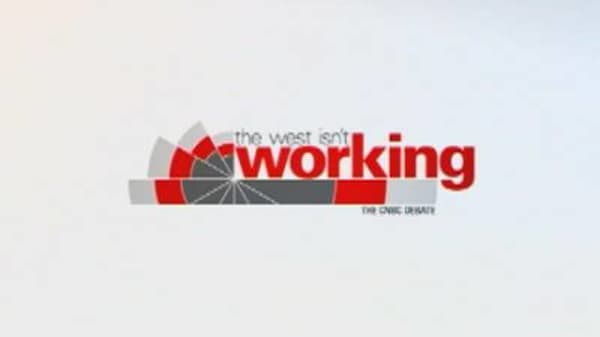The Federal Reserve says joblessness is its biggest concern, unemployment remains stubbornly high despite a rebound in US growth and those with jobs in the West are very worried that Chinese or Indian workers will undercut them on wages and steal their jobs.
At the World Economic Forum in Davos, CNBC held a keynote session asking if the rise of the East is assured and what that will mean for the jobs market in America and Europe.
“If we don’t tackle unemployment at source, we will find out that it will cost us much more later,” said Sir David Bell of the Economist Group.
“They should be scared about how efficient the Chinese economy is becoming because it will, if we allow it, dominate the world economy," David Arkless, the president of government affairs at Manpower, added. "The issue is, can we compete? Can the West come back?”
On Tuesday evening President Barack Obama admitted as much in his state of the union address.
“The world has changed and for many the change has been painful. I’ve seen it in the shuttered windows of once booming factories and the vacant storefronts on once busy main streets,” Obama said.
“I’ve heard it in the frustrations of Americans who have seen their paychecks dwindle or their jobs disappear. Proud men and women who feel like the rules have been changed in the middle of the game. They’re right. The rules have changed,” he added.
The East Will Win
Making the case for Asia was Mazumdar-Shaw, the CEO of Indian biotech group Biocon.
“Jobs will move from the stagnant, mature markets of the Western Hemisphere to the very vibrant and high growth markets in the East. And you know, in an interconnected world, I think companies will be compelled to move money and jobs to make them more globally competitive to the East,” Mazumdar-Shaw said.
“You have to accept that jobs will move to regions where there is high growth and higher returns. You know, manufacturing, conventional, traditional manufacturing is going to move east because that's where the lower labor costs are, that's where better capital efficiencies are. So this is the shape of things to come and the West has to accept it,” he added.
Barry Silbert, CEO of SecondMarket who has made as fortune investing in internet start-ups, disagrees that the West cannot create thriving businesses and the jobs they bring with them.
“There are four key critical elements that are necessary to starting and growing a business. First, you need the skill of an educated workforce. Second, you need rule of law, including intellectual property protection. Third, you need a proper balance between government regulation and free markets. And lastly, you need access to capital,” Silbert said.
“And it is this final element that I believe the west outshines the East in particular. The West, I believe, has the most developed capital formation process, from angel investing to venture and private equity funds, to the markets, both public and now private, necessary to support innovative businesses. And it is these types of companies that create long-lasting, sustainable jobs,” he explained.
Wake Up, G20!
Philip Jennings, who is the president of the UNI Global Union mounted a passionate defense of the Western workers, who he believes have been let down by the bankers and the politicians.
“We need a message of hope. The working people of the West are ready to save the West if they're given the chance. There was a rotten business model in the West which brought those economies to their knees," Jennings said.
"It was the people that paid the bill. They are angry, they are cornered. And if we have the argument... if I have to face a group of workers and I say, the future's in the East, there will be more jasmine revolutions by the day,” he added.
“People have to wake up. The G20, wake up! We've asked for a working party at the G20 on employment. We're still arguing. Sarkozy's in Davos. I hope he's got his jobs mojo with him. The G20 has to wake up. We have to look at inequality. Henry Ford was right; you put money in workers' pockets and we'll make the wheels of the economy turn. It is not happening,” said Jennings.
The union leader was backed by Arianna Huffington, the editor in chief of The Huffington Post.
“I think what is missing is that sense of urgency. I mean, politicians, as the president said in the state of the union, talk about jobs, but they are not really doing anything about jobs,” Huffington said.
“And it's this factional political system in the West that's making it so difficult to produce anything but suboptimal solutions that's creating that danger. Because remember, when the west brought a sense of urgency to saving the financial system, they saved the financial system. We have enough tools in our toolbox; it's just that we never brought that same sense of urgency around jobs. And yet it's not just the economic problems that ensue, it's the political instability that is growing,” Huffington added.
Easier in the West
But Laura Tyson, an economic advisor to the White House and a Professor at the University of California Berkley disagreed.
“Look at issues of ease of doing business. That list is dominated by many Western economies, including the United States. And with the right capital market conditions, with the right demand conditions, with the right physical and monetary policy, the US has been and will be in the future a powerhouse of entrepreneurship,” Tyson said.
“Most jobs that most people have in the world, for now and the foreseeable future, even though they will be globally integrated, will be local jobs. They will be jobs that are service jobs for the people who live in their regions, their communities, their states and their nations,” she said.
Duncan Niederauer, the CEO of the NYSE Euronext, sees opportunity where others see threats.
“I think if we think about the focus on job creation, the impact that has on creating demand that some of you talked about, then guess what? The pie gets bigger for all of us, and it’s good for everybody. And I think from our vantage point at the exchange, what we focus on is good news," Niederauer said.
"The job creation engine you’d want to fuel, it’s about incentives for companies who are positioned to be able to do an IPO, and it’s about some of the things Barry was talking about for companies who may be too small to contemplate an IPO, and that’s about getting them capital,” he added.
“Get them the capital. Worldwide, they’ll create the jobs and we can get people back to work. It’s an opportunity,” Niederauer said.





